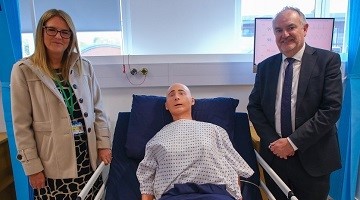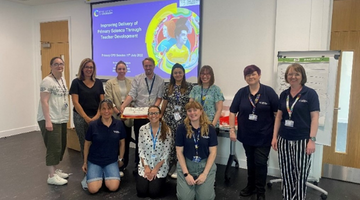About this course
Develop your clinical practice further by completing this programme that combines workplace-based learning with academic studies and is aligned with Health Education England’s Newly Qualified Pharmacist Pathway and the Royal Pharmaceutical Society’s Post-registration Foundation Curriculum.
This programme caters for pharmacists employed in secondary or tertiary care settings and allows you to develop your practice as a clinical pharmacist. Whilst it is primarily tailored to pharmacists in the early stages of their career, it is not exclusive to these individuals. Highlights of this programme include:
- Use of blended learning, which combines workplace-based learning, university-based workshops and self-directed online learning. This approach allows integration of theory and practice and a degree of flexibility since students can align studying the online learning materials with practice-based activities and current rotations
- Interactive and stimulating workshops designed and delivered by experienced and specialist practising pharmacists
- Use of workplace-based learning and regular formative feedback to build on the knowledge, skills, behaviours and experiences gained during your undergraduate and pre-registration years
- The option of completing an Independent Prescribing Pathway (accredited by the GPhC) during the second year of the programme
- Benefit from over 30 years’ experience in providing clinical pharmacy training
- Provision of training to Workplace Education Supervisors
This programme will enhance your knowledge of therapeutics, powers of communication, critical thinking and problems solving skills. By promoting an understanding of the inter-disciplinary nature of healthcare, your appreciation of the problems encountered by other healthcare professionals will grow. The programme encourages a rigorous scientific approach to clinical pharmaceutical problems and the need to develop logical arguments, to enable you to optimise medicines for patients with complex problems and multiple co-morbidities. You will be able to promote and assess clinical pharmacy services and make evidence-based recommendations to benefit both your patients and place of work.
The School of Pharmacy and Biomoleclar Sciences has established the Clinical Pharmacy and Therapeutics Research Group.
Course modules
Discover the building blocks of your programme
This course is currently undergoing its scheduled programme review, which may impact the advertised modules. Programme review is a standard part of the University’s approach to quality assurance and enhancement, enabling us to ensure that our courses remain up to date and maintain their high standard and relevancy.
Once the review is completed, this course website page will be updated to reflect any approved changes to the advertised course. These approved changes will also be communicated to those who apply for the course to ensure they wish to proceed with their application.
Your programme is made up of a number of core modules which are part of the course framework. Some programmes also have optional modules that can be selected to enhance your learning in certain areas and many feature a dissertation, extended report or research project to demonstrate your advanced learning.
You can choose between three options for your target award:
• Postgraduate Certificate (PgCert) – this consists of 60 academic credits and is normally completed over one year
• Postgraduate Diploma (PgDip) – this consists of 120 academic credits and is normally completed over two years
• Master of Science (MSc) – this consists of 180 credits and would take at least three years to complete. Students can choose between selecting the MSc as their initial target award or applying to ‘top up’ an existing PgDip at a later date
Each target award consists of core and optional modules, with the MSc requiring completion of a 60 credit research project module. This module is normally completed over 12 months, during which time you will be expected to apply for ethics, conduct a literature review, collect and analyse your data and write up and submit your dissertation by month 11. To help you complete within this timeframe it is important to have a final research proposal and to have understood the necessary ethical approvals and prepared the necessary paperwork at the point of enrolment. Please contact Gareth Nickless (G.D.Nickless@ljmu.ac.uk) to discuss your Masters’ research project idea so that she can provide guidance and support on your readiness to apply.
Further guidance on modules
Modules are designated core or optional in accordance with professional body requirements, as applicable, and LJMU’s Academic Framework Regulations. Whilst you are required to study core modules, optional modules provide you with an element of choice. Their availability may vary and will be subject to meeting minimum student numbers.
Where changes to modules are necessary these will be communicated as appropriate.
Core modules
Developing Hospital Pharmacists' Practice
20 credits
20 credits
This module is for the PGCert, PGDip and MSc. The module aims to develop students' clinical practice and facilitate engagement with self-directed learning to promote an ethos of life-long learning.
Principles of Medicines Optimisation
20 credits
20 credits
This module is for the PGCert, PGDip and MSc. This module aims to develop students’ ability to optimise medicines for individual patients (including those with multi-morbidity) by updating their knowledge of clinical therapeutics and skills in its application in real-life practice.
Quality Improvement in Healthcare
20 credits
20 credits
This module is for the PGDip and MSc. The aim of this module is to enable students to develop skills in research methods and expertise in the evaluation, delivery and development of an area of healthcare. This module also includes appropriate research methods and research skills to support students who wish to complete an MSc dissertation.
Research Project
60 credits
60 credits
This module is for the MSc. The module will enable you to develop and extend your research abilities and complete a research project.
Optional Modules
Medicines Optimisation in Hospitals
20 credits
20 credits
This module is for the PGCert, PGDip and MSc. The module aims to develop the clinical knowledge and skills required by hospital pharmacists for managing medicines in patients that are admitted to hospital.
Independent Prescribing for Pharmacists
40 credits
40 credits
The module develops the personal, professional, clinical and diagnostic skills required to deliver person-centred care as a pharmacist independent prescriber. Successful completion of this module enables individuals to apply to the General Pharmaceutical Council for annotation as an Independent Prescriber.
Oncology Pharmacy Practice in Secondary Care
20 credits
20 credits
This module is for the PGDip and MSc. The module provides clinical knowledge and skills that are relevant to the needs of healthcare professionals working with medicines in oncology and to facilitate your professional development, including fostering development of an enquiring, open-minded attitude, tempered with scientific discipline for oncology medicine, which encourages lifelong learning.
Advanced Paediatric Pharmacy Practice
20 credits
20 credits
This module is for the PGDip and MSc. The module provides clinical knowledge and skills that are relevant to the needs of healthcare professionals working with medicines in advanced paediatric practice and to facilitate the professional development of the student, including fostering development of an enquiring, open-minded attitude, tempered with scientific discipline for paediatric medicine, which encourages lifelong learning.
Fundamental Paediatric Pharmacy Practice
20 credits
20 credits
This module is for the PGDip and MSc. The module provides clinical knowledge and skills that are relevant to the needs of healthcare professionals working with medicines in fundamental paediatric practice and to facilitate professional development, including fostering development of an enquiring, open-minded attitude, tempered with scientific discipline for paediatric medicine, which encourages lifelong learning.
Clinical Leadership in Medicines Optimisation
20 credits
20 credits
This module is for the PGDip and MSc. The module aims to develop students' leadership skills to enable you to implement initiatives to optimise medicines for the wider population both within an organisation and between healthcare sectors.
Education and Training in Healthcare
20 credits
20 credits
This module is for the PGDip and MSc. The module aims to develop the knowledge and skills required to deliver and critique education and training sessions to healthcare professionals.
Your Learning Experience
An insight into teaching on your course
Study hours
A significant portion of learning activities will take place in your workplace as you apply your acquired knowledge and skills to the care of your patients. Students are expected to undertake approximately 8-10 hours per week of private study (which includes preparation for webinars and workshops, as well as completing assignments).
Workshops and webinars
Following the relaxation of social distancing measures, on-site teaching for workshops (on a mixture of weekday and weekend dates) have resumed.
Depending on the number of applications received, the weekday workshops may need to be run twice. Therefore, you will be informed of your allocated date when you are offered a place on the programme.
Year 1 workshops – March 2025 cohort
Group 1
- Workshop 1
12 March 2025 - Workshop 2
23 April 2025 - Workshop 3
9 July 2025
Group 2
- Workshop 1
13 March 2025 - Workshop 2
24 April 2025 - Workshop 3
10 July 2025
Year 1 workshops – September 2025 cohort
Group 1
- Workshop 1
10 September 2025 - Workshop 2
15 October 2025 - Workshop 3
14 January 2026
Group 2
- Workshop 1
11 September 2025 - Workshop 2
16 October 2025 - Workshop 3
15 January 2026
Year 2 workshops
Those applying for direct entry into the second year of the PgDip (i.e. those who have completed a PgCert at another higher education institute) will normally start by completing the Quality Improvement in Healthcare module.
- The date for the March 2025 cohort workshop is 6 March 2025
- The date for the September 2025 cohort workshop is 9 September 2025
Webinars are held either during weekday lunch times (typically 1.00pm to 2.00pm) or during week day evenings (typically 8:00pm to 9:00pm). Dates will be provided following registration on the programme. Recordings of all sessions will be made available for those unable to attend.
Teaching methods
The programme’s blended learning approach features a range of online directed study activities (including recommended reading, short recorded lectures and quizzes), webinars, face-to-face study days (in the form of seminars and workshops) and workplace-based learning. To develop an ethos of adult learning, didactic teaching methods are minimised and completing the pre-requisites before attending webinars and workshops will enable you to get the most benefit.
Tutor support
The programme team will allocate you with a Personal Tutor who will offer 1:1 tutorials to discuss:
- Your engagement with the programme (based on attendance at workshops, completion of online study materials, providing feedback after study days)
- Key learning points from study days and how you will subsequently change your practice
- Progress with assignments and portfolio activities
- Feedback from summative assessments
Your employer will allocate you a Workplace Education Supervisor (WES) who will provide mentorship and guidance in the workplace and facilitate completion of supervised learning events (SLEs) to provide you with regular feedback on how to develop your practice. Download the requirements for workplace-based support (including WES’ responsibilities). All WES are provided with training that will cover workplace-based learning and assessment, mentoring and feedback skills.
How learning is monitored on your programme
To cater for the wide-ranging content of our courses and the varied learning preferences of our students, we offer a range of assessment methods on each programme.
The programme utilises a range of assessment methods including: written reports, reflective essays, portfolios, case presentations, written examinations and Objective Structured Clinical Examinations (OSCEs). All assessments are moderated internally and externally, with merits and distinctions being awarded for very good and exceptional overall performance respectively. You will accumulate credits as you complete each module. The MSc research project requires the submission of a project report.
Where you will study
The programme is delivered in the student's workplace.
University staff are based in the Faculty of Science in the City Campus. Here you 'll find state-of-the art laboratories and teaching spaces. In terms of independent study support, the Avril Robarts Library is located just minutes away from the Faculty of Science on Tithebarn Street.
Course tutors

Gareth Nickless
Programme leader
I have seen former students make great strides in their careers after completing the programme with some moving into senior management or leadership roles.
I have seen former students make great strides in their careers after completing the programme with some moving into senior management or leadership roles.
After qualifying in 2000, Gareth started work as a hospital pharmacist. He completed the Postgraduate Diploma in Clinical Pharmacy and then took up a split post as Specialist Pharmacist for Gastroenterology/Teacher Practitioner at LJMU. In 2007, Gareth moved into his current post, focusing on the Postgraduate Diploma in Clinical Pharmacy. Recognising the need for continuing professional development, he qualified as an Independent Prescriber in 2009 and became a Fellow of the Higher Education Academy in 2016. Gareths research interests cover workplace-based learning and assessment and medicines optimisation.
-
 Clinical Lead Tutor
Clinical Lead Tutor -
 Lecturer/Senior Lecturer
Lecturer/Senior Lecturer -
 Non Contracted
Non Contracted -
 Lecturer/Senior Lecturer
Lecturer/Senior Lecturer
Career paths
Further your career prospects
LJMU has an excellent employability record with 96% (HESA 2018) of our postgraduates in work or further study six months after graduation. Our applied learning techniques and strong industry connections ensure our students are fully prepared for the workplace on graduation and understand how to apply their knowledge in a real world context.
The School of Pharmacy and Biomolecular Sciences is a partner with the Centre for Pharmacy Innovation (CfPI). The CfPI provides excellent links with community pharmacy and secondary care, through the other partners, Lloyds Pharmacies and The Royal Liverpool and Broadgreen University Hospitals NHS FT. These links have helped to support the development of this programme and provide assurance regarding the relevance of the course and its content.
Pharmacists are in high demand all over the world and a career in Pharmacy is both focused and rewarding. Under the Agenda for Change, many pharmacists require a postgraduate diploma to move from a Grade 6 to a Grade 7 post, with research skills also increasingly being recognised in requirements for Grade 8 posts.
Tuition fees and funding
- Part-time per year:
- £3,300
The University reserves the right to increase tuition fees in accordance with any changes to the maximum allowable fees set by the UK Parliament. In the event of such a change, any fee increase will be subject to a maximum cap of 10% of the total course cost as originally stated at the time of your offer.
Fees
The fees quoted at the top of this page cover registration, tuition, supervision, assessment and examinations as well as:
- library membership with access to printed, multimedia and digital resources
- access to programme-appropriate software
- library and student IT support
- free on-campus wifi via eduroam
Additional costs
Although not all of the following are compulsory/relevant, you should keep in mind the costs of:
- accommodation and living expenditure
- books (should you wish to have your own copies)
- printing, photocopying and stationery
- PC/laptop (should you prefer to purchase your own for independent study and online learning activities)
- mobile phone/tablet (to access online services)
- field trips (travel and activity costs)
- placements (travel expenses and living costs)
- student visas (international students only)
- study abroad opportunities (travel costs, accommodation, visas and immunisations)
- academic conferences (travel costs)
- professional-body membership
- graduation (gown hire etc)
Funding
There are many ways to fund postgraduate study for home and international students. From loans to International Scholarships and subject-specific funding, you’ll find all of the information you need on our specialist postgraduate funding pages.
Please be aware that the UK’s departure from the EU may affect your tuition fees. Learn more about your fee status and which tuition fees are relevant to you.
- Part-time per year:
- £9,125
International Scholarships and payment plans
Liverpool John Moores University is committed to supporting international students by providing a range of scholarships and flexible payment plans to help students manage their tuition fees.
Scholarships
LJMU provides a variety of scholarships to support international students. Scholarships are available to self-funded students who have accepted their offer and met all the conditions outlined in their offer letter. Students must also demonstrate that they can cover living costs, travel, and other expenses associated to studying at the university. Postgraduate scholarships include tuition fee reductions and are often offered in partnership with external funding organisations.
All self-funded international students are eligible for an automatic scholarship worth up to £4,000. For more details and to view our full list of scholarships, visit the international scholarship webpages.
Deposit
All students must pay a £5,000 deposit before they can receive their CAS letter.
For more information view our deposit page.
Tuition Fee Payment Plan
After paying their £5,000 deposit, students have the option to pay their fees in full or in three equal instalments minus any internal scholarships and discounts. There are two payment options available for international students. You can either pay your tuition fees in full before enrolment or opt for a payment plan. With the payment plan, you can pay your fees in three instalments after making your £5,000 deposit. The first instalment is due before enrolment.
All payments should be made through Flywire. Full details can be found in the How to Pay Guide.
Early Bird Tuition Fee discount
We are excited to introduce a £500 Early Payment Discount to all self-funded international students. Eligible self-funded students who pay their fees by the required deadlines will get a discount which will be automatically deducted from the 1st year of tuition fees.
To see the required deadlines please visit the webpage
Entry requirements
You will need:
Qualification requirements
Undergraduate degree
- an honours degree in pharmacy or equivalent
Additional requirements
-
Interview required
- You may be interviewed
Further information
-
Extra Requirements
- Students that have obtained an appropriate Postgraduate Diploma in Clinical Pharmacy from LJMU or another institution may be considered for direct entry to the 60-credit research project module to top up their award to a full MSc. Students applying for this route do not need to be employed in a role in England, but must be in a position that would allow them to complete a relevant research project. Individuals interested in this route should contact the course leader by emailing: PBS-Office@ljmu.ac.uk to discuss their circumstances prior to submitting an application.
- to be a UK registered (GPhC) pharmacist working in a Secondary Care role, with an opportunity to contribute to the clinical care of patients
- a term of employment sufficient to allow completion of the registered course (1 year for PgCert and 2 years for Diploma). This does not apply to those applying to 'top-up' a Clinical Pharmacy PgDip to the MSc
-
RPL
- Recognition of prior learning may be accepted for direct entry onto the 2nd year of the PgDip if you have already completed a pharmacy-related PgCert at another UK university.
International requirements
IELTS
- IELTS requirements 6.5 (Minimum of 5.5 in each component)
Further information
-
Extra Requirements
- Students that have obtained an appropriate Postgraduate Diploma in Clinical Pharmacy from LJMU or another institution may be considered for direct entry to the 60-credit research project module to top up their award to a full MSc. Students applying for this route do not need to be employed in a role in England, but must be in a position that would allow them to complete a relevant research project. Individuals interested in this route should contact the course leader by emailing: PBS-Office@ljmu.ac.uk to discuss their circumstances prior to submitting an application.
- to be a UK registered (GPhC) pharmacist working in a Secondary Care role, with an opportunity to contribute to the clinical care of patients
- a term of employment sufficient to allow completion of the registered course (1 year for PgCert and 2 years for Diploma). This does not apply to those applying to 'top-up' a Clinical Pharmacy PgDip to the MSc
-
RPL
- Recognition of prior learning may be accepted for direct entry onto the 2nd year of the PgDip if you have already completed a pharmacy-related PgCert at another UK university.
Please Note: All international qualifications are subject to a qualification equivalency check.
How to apply
Securing your place at LJMU
To apply for this programme, you are required to complete an LJMU online application form. You will need to provide details of previous qualifications and a personal statement outlining why you wish to study this programme.
You will need to complete our online application form and submit the supporting documents listed in this section. When completing this form, please note:
- The level of entry is 'Postgraduate Taught'
- Mode of study is 'Part time (EU/Home applicants only)'
- You should then be able to find Clinical Pharmacy for Secondary and Tertiary Care (PgCert, PgDip or MSc) when browsing courses. Please ensure that you select the correct target award and corresponding entry date
- For Current/Previous Qualifications, you only need to include details of your pharmacy qualification and any other university qualifications that you have; details of GCSEs, A-levels or International Baccalaureate are not required
- Your personal statement needs to reflect your suitability and aptitude for the programme. For the application to be accepted by the system, this section needs to be at least 3,000 characters long
You will need to upload or complete the following supporting documents:
- Complete our supplementary application form
- Upload certificate(s) for any degree level or postgraduate qualifications listed in your application
- If applying for direct entry to the PgDip or MSc year of the programme
o Transcript from the Board of Examiners (or equivalent title), which lists the modules completed (and their academic credit rating) and mark(s) achieved
o Copies of the module guides for the modules completed or programme guide, to allow the team to assess which modules on the programme can have accreditation of prior experience and learning granted
- If English is not your first language
o Details of the university level qualification that you have recently completed in English, or
o A copy of a recent IELTS certificate
The Lead Pharmacist for Education (or equivalent) in your department to e-mail the following documents to pbs-office@ljmu.ac.uk:
- A completed practice-based support and fees declaration form. Please note that this form has been designed to allow Trusts to submit one form for all their pharmacists applying for a particular cohort. Access details of the practice-based support required
- A two-page summary CV from your practice-based pharmacist tutor
- If your employer is paying all or part of your fee, a copy of the purchase order
NOTE: all documents need to be submitted by the application deadline listed on the website. Late submissions may be possible if the programme team are If there is to attach documents after this date, you will need to email them to the School office: PBS-Office@ljmu.ac.uk. Submitting these forms after the deadline can delay your registration and subsequent access to the virtual learning environment.
Application deadlines
Intake: March 2025
Deadline: 13 January 2025
Intake: September 2025
Deadline: 14 July 2025
Your university life
From accommodation and academic support to clubs and societies. Find out what LJMU has to offer.
Related Links
Talk to our students
Connect with a current LJMU student for advice and guidance on university life, courses and more.
See what our students are saying
At LJMU we want you to know you’re making the right choice by studying with us. You can see what our students are saying about their experience with us through their reviews on the following websites:
Related Links
News and views
Browse through the latest news and stories from the university










The University reserves the right to withdraw or make alterations to a course and facilities if necessary; this may be because such changes are deemed to be beneficial to students, are minor in nature and unlikely to impact negatively upon students or become necessary due to circumstances beyond the control of the University. Where this does happen, the University operates a policy of consultation, advice and support to all enrolled students affected by the proposed change to their course or module.
















